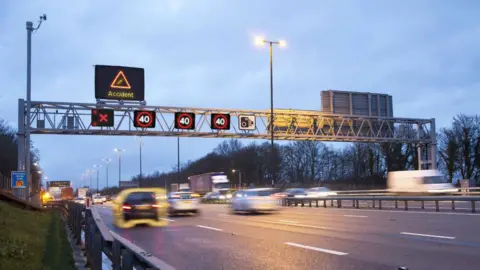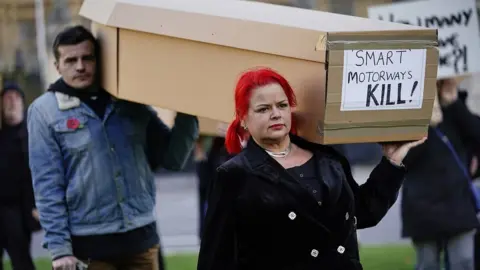Call for five-year delay in all-lane smart motorways
 Gov.uk
Gov.ukThe introduction of "all-lane" smart motorways should be halted until their safety can be ensured, MPs have warned.
The schemes use the hard shoulder as a permanent live traffic lane to increase capacity - but critics say this has contributed to deaths on the roads.
In a report, the Commons' Transport Select Committee said there was not enough safety and economic data to justify continuing with the plans.
The Department for Transport said it would consider the recommendations.
However, the report did not recommend reinstating hard shoulders where they have been removed.
Claire Mercer, whose husband Jason was killed on a stretch of smart motorway near Sheffield in 2019, wants that to happen and said the report's recommendations did not "go far enough".
 PA Media
PA MediaSmart motorways, which use technology to maintain the flow of traffic and give information on overhead displays, have existed in England since 2002.
There are three types - the all-lane-running version, which involves opening the hard shoulder permanently to drivers, began in 2014.
The other types are controlled motorways, which have three or more lanes, variable speed limits and a hard shoulder for emergency use, and dynamic hard shoulder motorways, which have variable speed limits and a hard shoulder that can be opened up to traffic at busy times.
There are about 375 miles of smart motorway in England, including 235 miles without a hard shoulder.
According to government figures obtained by Panorama in 2020, 38 people were killed on smart motorways between 2014 and 2019.
Mrs Mercer's husband Jason was killed when he and another driver stopped in a live lane of an all lane running motorway following a minor collision and were hit by a lorry.
Mrs Mercer said: "We need the hard shoulder because everything that they have tried to substitute it with doesn't work.
"The hard shoulder was just there, it didn't rely on software, it didn't rely on humans, it was just there and you could use it when you needed it."

Analysis by Caroline Davies, Transport Correspondent
In a nutshell, this report is saying wait, don't get rid of more hard shoulders, but don't put them back either.
The argument has been intensifying between campaigners and the government.
The Transport Select Committee argues that the existing data can be cut both ways so the best option is to improve safety on the ones already built and wait for five years so the data is more reliable.
That hasn't been well received by campaigners who argue that any delay could lead to more deaths.
There are currently plenty of works under way to convert the hard shoulder on other motorways too and the government is under no obligation to follow these recommendations.
But the hope from the committee is that they've offered a pragmatic approach that might be more appealing to the government.

The committee's report said: "The government and National Highways should pause the rollout of new all-lane running schemes until five years of safety and economic data is available for every all-lane running scheme introduced before 2020 and the implementation of the safety improvements in the government's action plan has been independently evaluated."
It described the government's decision in March 2020 that all future smart motorways would be all-lane-running versions as "premature".
Demonstrators protesting against smart motorways marched with coffins to the Houses of Parliament on Monday.
 PA Media
PA MediaRelatives of those killed on smart motorways have called for the hard shoulder to be permanently reinstalled after a number of incidents in which broken-down vehicles were hit from behind.
However, the committee said it was "not convinced" that such a policy would boost safety.
It concluded: "The evidence suggests that doing so could put more drivers and passengers at risk of death and serious injury" as motorway capacity would be reduced.
It said: "If that traffic were diverted on to A-roads, it might result in an extra 25 deaths and 224 serious casualties per year."
The committee pointed out that controlled motorways, which retain the hard shoulder and have technology to regulate traffic, have the lowest casualty rates of all types of motorway on the network.
It said: "The Department and National Highways should revisit the case for controlled motorways."
Responding to the report, Labour's shadow transport secretary Jim McMahon said the government must listen to victims' families.
"We know smart motorways in their current form, coupled with inadequate safety systems, are not fit for purpose and are putting lives at risk," he said.
A Department for Transport spokesperson said: "We're pleased that the TSC (Transport Select Committee) recognises that reinstating the hard shoulder on all all-lane running motorways could put more drivers and passengers at risk of death and serious injury and that we're right to focus on upgrading their safety."
